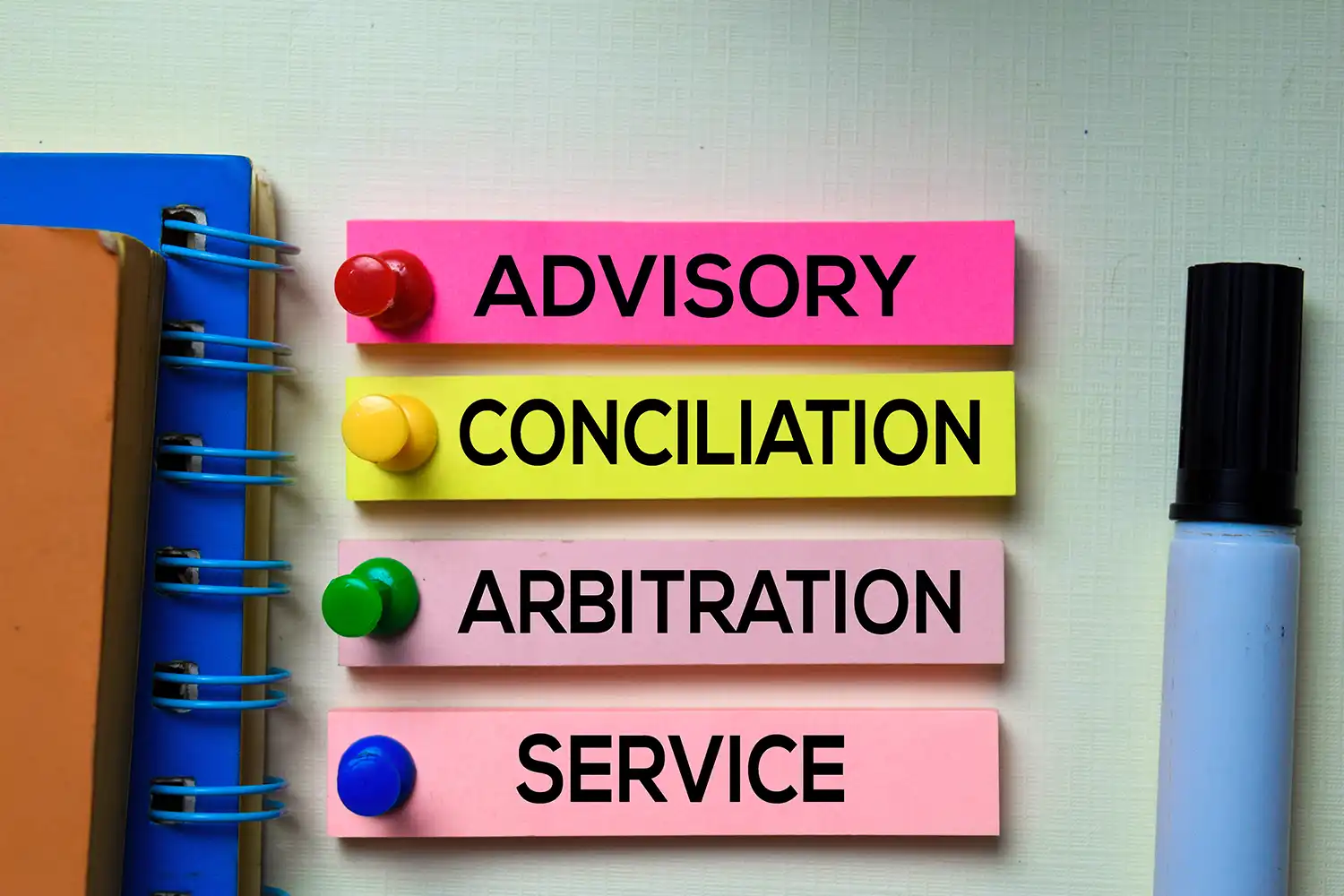Employment law and Acas
If you have an issue at work, whether related to a disciplinary, your rights or anything else, it’s helpful to have a free resource available that can offer you some initial guidance on what to do about it.
Acas (the Advisory, Conciliation and Arbitration Service) provides such a service, with the goal of promoting good relations between employees and their employers.
In this way, they complement the role of employment solicitors who – unlike Acas – can offer you an opinion or legal advice on what your personal next steps in a specific dispute should be.
Below we briefly outline the role Acas is able to play in the employment sector and the kinds of services they provide.
See also Monaco Solicitors’ list of Guides at the end of this article for further details about related legal activities and advice.

What is Acas?
Acas is a government-funded organisation that provides guidance and support to both employees and employers for dealing with day-to-day workplace issues.
Their website includes a significant information resource about topics such as minimum wage, holidays, sick pay, redundancy, disciplinary and grievance issues and more.
They also provide conciliation services to try and resolve work-related disputes before they have to be heard by an employment tribunal and arbitration services designed to resolve unrest in the workplace. (See below for more.)
What kinds of advice does Acas give?
Acas are able to offer impartial and practical advice free of charge and related to a variety of work-based situations. This is to help make employees better aware of their rights and also to give employers the resources they need to ensure that their actions and procedures are lawful.
The published articles on the Acas website provide a solid foundation for employees to understand their legal rights in work-related situations and a valuable set of initial ‘signposts‘ to your options in a dispute.
Should you go to Acas or a solicitor for advice on employment matters?
When you speak with Acas they will provide you with general information about your employment rights and issues. However, Acas does not offer an opinion or legal advice on what your personal next steps in a specific dispute should be.
This is one of the ways in which solicitors complement Acas. For example, a solicitor will be able to assess your individual situation and tailor their advice on the tactics and strategies you should adopt so as to achieve an outcome in your favour, whether that’s negotiating a settlement agreement or presenting your case to an employment tribunal.
Even if you are entering into an Acas early conciliation process to settle a dispute out of court (see below) we suggest that it’s a good idea also to seek independent legal advice. This ensures you will be in a better position to negotiate with your employer by using a strategy designed to help you achieve the outcome closest to the one you want.
What are Acas Codes of Practice?
The Acas Codes of Practice provide initial guidance for employers, employees and their representatives on practices and procedures for handling grievances, disciplinary, performance and other situations in the workplace. They serve as a benchmark in the legal profession, and an employer’s unreasonable failure to comply with these standards can potentially lead to a significant increase for you in the amount of compensation awarded by an employment tribunal.
Examples of Acas Codes of Practice:
Commonly used Codes of Practice include:
- Disciplinary: The code includes guidance on how a disciplinary investigation for an employee’s poor work performance or behaviour should be conducted, together with guidelines for disciplinary hearings. (See also our guide for employees on Disciplinaries.)
- Grievances: Where an employee has an issue with an employer Acas offers guidance on how to raise a formal complaint. (See also our own guide on Grievances.)
- Capability (or Performance): Employers can follow capability procedures set out by Acas for staff members who are not meeting the required standard of work. (See also our guide for employees on Performance.
- Dismissals: Employers are given guidance on how to dismiss a member of staff by following a fair process. (See also our variety of guides on dismissals, including Unfair dismissals, Constructive dismissals, Wrongful dismissals and Redundancy dismissal negotiations.)
What happens if your employer ignores Acas codes?
If your employer ignores an Acas Code which relates to your employment tribunal case, they stand a greater chance of not only losing the case but also of having to pay you more compensation.

What arbitration services does Acas offer?
Acas also offers arbitration services to groups of employees (collective arbitration) and in some limited circumstances, to individuals. These services are free of charge.
Acas collective arbitration service
This is where a group of employees wants a third party (Acas in this case) to arbitrate in a dispute with their employer.
Before arbitration begins both parties must agree to accept the decision given by the Acas appointed arbitrator once the evidence has been presented. A hearing date, time and place will be agreed upon and an arbitrator will listen to the arguments put forward by both sides.
The hearing will usually take place in the workplace and last for around half a day, depending on the complexity of the issue(s).
Within 3 weeks of the hearing date, the arbitrator’s decision will be presented in writing (known as an ‘award’). As both parties pledged to agree with the final decision it cannot be challenged in court.
Acas individual arbitration service
Acas individual arbitration is limited to cases where an employee alleges unfair dismissal or makes claims relating to flexible working. It can be seen as an alternative to an employment tribunal for these cases.
The process is similar to that outlined above for collective arbitration, adjusted to suit the needs of individual employees. The arbitrator’s decision is legally binding.
Next steps
You can contact Acas via their website or their helpline, 0300 123 1100 for help with the services they offer.
If you need legal advice, opinion or practical help with drafting legal letters tailored to your individual needs and circumstances, then Monaco Solicitors can help. Our experienced team of fully qualified solicitors specialises in employment law for employees.
Get in touch with us via the Monaco Solicitors’ website, or by phone 020 7717 5259. or email communications@monacosolicitors.co.uk.
Note: This page draws largely from Monaco Solicitors’ practical experience of Acas and the information presented on Acas’s website. The factual accuracy of the content reflects the Acas website at the time of publication.
The writing team at Monaco Solicitors has tried to present a reasonable overview of what Acas does. However, as Monaco only represents employees, the article does focus slightly more on the support Acas offers to employees rather than employers.
Our related guides
- Employment tribunals: Commencing the Acas pre-claim process
- Disciplinaries at work: a practical guide
- Grievances at work
- Performance improvement procedures and plans (PIPs) at work
- Unfair dismissal settlements and compensation
- Constructive dismissal: A guide for employees
- Wrongful dismissal and gross misconduct: an employee guide
- Redundancy: a guide for employees

